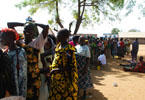
The Allard K. Lowenstein International Human Rights Clinic at Yale Law School wrote this guest post and the report it introduces.
Preliminary results from the historic referendum on southern Sudanese independence indicate that secession is likely. Now it is time for the governments of Sudan and southern Sudan and international actors to focus their attention on the long-ignored issue of justice for survivors of gender-based violence in southern Sudan.
The recent launch of the new U.N. Entity for Gender Equality and the Empowerment of Women, or U.N. Women, on New Year’s Day provides the perfect opportunity for the United Nations to take action on this issue. The United Nations must acknowledge that justice for survivors of gender-based violence is a critical element of a peaceful outcome in Sudan and not just a “gender issue.”
A study prepared by the Allard K. Lowenstein International Human Rights Clinic at Yale Law School for the Enough Project and released today examines the extent and sources of gender-based violence in southern Sudan and analyzes the ability of survivors of violence to secure justice. According to the report, Sudanese authorities and the international community have failed to protect women from violence. International actors concerned about Sudan’s future, including the United States, must take steps to prevent gender-based violence in southern Sudan and to hold perpetrators accountable.
For too long, women and girls who have suffered rape, domestic violence, and human trafficking in southern Sudan have been unable to obtain justice. Men kidnapped, tortured, and gang-raped women during the 21-year civil war between the North and the South that ended in 2005. Now women face physical assault and rape by soldiers in the Sudan People’s Liberation Army and officers in the Southern Sudan Police Services. Women are subjected to violence during inter-ethnic raids. These raids have traditionally been attributed to cattle rustling, but Médecins Sans Frontières has reported that recent attacks have specifically targeted women and children.
Soldiers and police officers commit a significant portion of the gender-based violence. Unfortunately, they are immune from prosecution under several Sudanese laws, unless their supervisors waive the immunity. Supervisors rarely do so. In addition, a presidential decree issued in 2005 protects soldiers and officials from being prosecuted for crimes carried out “during the execution of [their] duties.” Therefore, officials have been able to avoid prosecution for rape by claiming that the sexual assaults were committed while carrying out their duties.
Even where the perpetrator is not affiliated with the government, barriers to prosecution exist in the legal definition of rape itself. Rape is classified in Sudanese criminal law within zina, the larger category of offenses that encompasses rape, sodomy, and adultery. If a woman is raped by a man who is not her husband and she cannot prove that the sex was not consensual, she could end up being accused of adultery and prosecuted for zina. And she faces a high burden of proof: Under customary law, she must produce four witnesses who can attest to the fact that the sex was not consensual. When, despite these legal barriers, women do report crimes, they face corruption, retaliation, and social stigma.
The United Nations owes it to the women of Sudan to treat these serious problems as integral to the resolution of the conflict, rather than a side issue. The launch of U.N. Women is just the opportunity. In the past, the various U.N. agencies charged with furthering the rights of women were small and had overlapping responsibilities. Now they have been combined into a larger agency with twice the budget of the previous four agencies combined. Michelle Bachelet, the first woman to be elected president of Chile, heads the agency.
Ms. Bachelet should use her new high-profile position as under secretary general to urge the Security Council to treat gender-based violence as a critical security issue. The Security Council team that visited southern Sudan last fall should emphasize to officials in Khartoum and Juba, the capital of southern Sudan, that a peaceful future – for both countries – must include justice for survivors of gender-based violence.
A good first step in this process would be for the Security Council to fully implement its Resolution 1325 of 2000. The Resolution was the first to “acknowledge the crucial link between peace, women’s participation in decision-making, and the recognition of women’s life experiences throughout the conflict cycle.” To fully implement this resolution, the council must require consistency both in the secretary-general’s annual reporting on the resolution’s progress and in specific expectations for outcomes.
In addition, the Security Council should strengthen its Resolution 1820 of 2008 on sexual violence during times of conflict by: (1) closing the loopholes that allow parties to avoid responsibility for authorizing or condoning sexual violence and (2) extending the resolution’s applicability beyond sexual violence to encompass all gender-based violence in conflict.
The United States, too, should focus on the connection between peace in Sudan and justice for women. In the last several months, the United States has dramatically increased its engagement with Sudan in the preparations for the southern referendum. This is an encouraging sign after too many years of a hands-off approach toward implementing the Comprehensive Peace Agreement. Scott Gration, the U.S. Special Envoy for Sudan, as well as Secretary of State Clinton and President Obama, must make clear to Sudanese officials that justice for survivors of gender-based violence is non-negotiable.
Photo: Women in Juba line up to vote in the southern Sudan referendum (Enough/Laura Heaton)

